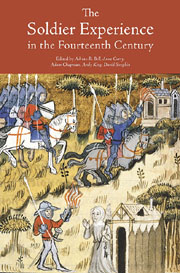Book contents
- Frontmatter
- Contents
- List of Contributors
- List of Abbreviations
- Introduction
- 1 Military Service and the Dynamics of Recruitment in Fourteenth-Century England
- 2 Total War in the Middle Ages? The Contribution of English Landed Society to the Wars of Edward I and Edward II
- 3 A Warlike People? Gentry Enthusiasm for Edward I's Scottish Campaigns, 1296–1307
- 4 Edward I's Centurions: Professional Soldiers in an Era of Militia Armies
- 5 Who's afraid of the Big Bad Bruce? Balliol Scots and ‘English Scots’ during the Second Scottish War of Independence
- 6 Rebels, Uchelwyr and Parvenus: Welsh Knights in the Fourteenth Century
- 7 Breton Soldiers from the Battle of the Thirty (26 March 1351) to Nicopolis (25 September 1396)
- 8 Towards a Rehabilitation of Froissart's Credibility: The Non Fictitious Bascot de Mauléon
- 9 The English Reversal of Fortunes in the 1370s and the Experience of Prisoners of War
- 10 The Soldier, ‘hadde he riden, no man ferre’
- Index
- Warfare in History
9 - The English Reversal of Fortunes in the 1370s and the Experience of Prisoners of War
Published online by Cambridge University Press: 05 February 2013
- Frontmatter
- Contents
- List of Contributors
- List of Abbreviations
- Introduction
- 1 Military Service and the Dynamics of Recruitment in Fourteenth-Century England
- 2 Total War in the Middle Ages? The Contribution of English Landed Society to the Wars of Edward I and Edward II
- 3 A Warlike People? Gentry Enthusiasm for Edward I's Scottish Campaigns, 1296–1307
- 4 Edward I's Centurions: Professional Soldiers in an Era of Militia Armies
- 5 Who's afraid of the Big Bad Bruce? Balliol Scots and ‘English Scots’ during the Second Scottish War of Independence
- 6 Rebels, Uchelwyr and Parvenus: Welsh Knights in the Fourteenth Century
- 7 Breton Soldiers from the Battle of the Thirty (26 March 1351) to Nicopolis (25 September 1396)
- 8 Towards a Rehabilitation of Froissart's Credibility: The Non Fictitious Bascot de Mauléon
- 9 The English Reversal of Fortunes in the 1370s and the Experience of Prisoners of War
- 10 The Soldier, ‘hadde he riden, no man ferre’
- Index
- Warfare in History
Summary
In the debate over the costs of the Hundred Years War, Postan famously considered that until a complete tally of prisoners (and ransoms) on both sides had been compiled we should consider profits and losses to be in balance. McFarlane and M.K. Jones did not share this opinion. According to them, the balance was undoubtedly highly favourable to the English. Adding to the debate, however, M.C.E. Jones carefully remarked that the misfortunes of English prisoners in the 1370s remain relatively obscure. Building on this comment, the purpose of this essay is to explore the fate of English (and English-obedient Gascon) prisoners of war during this period of French recovery. To what extent did they suffer from the reversal of fortunes in the 1370s? There is some clear evidence of English prisoners in trouble during this decade, which will be presented in the first part of this essay. However, the close scrutiny of various well-documented individual cases slowly shifted my focus from the debate on the extent of this reversal of fortunes and its impact on the issue of prisoners of war to the factors involved in the ransoming of these prisoners. These factors will be examined in the following two parts of this paper, in which I will investigate and assess the involvement of the crown and the warrior community in the liberation of prisoners. How particular was the context of the 1370s for the fate of English and Gascon prisoners? This last question will be addressed in the conclusion.
- Type
- Chapter
- Information
- The Soldier Experience in the Fourteenth Centur , pp. 191 - 208Publisher: Boydell & BrewerPrint publication year: 2011

